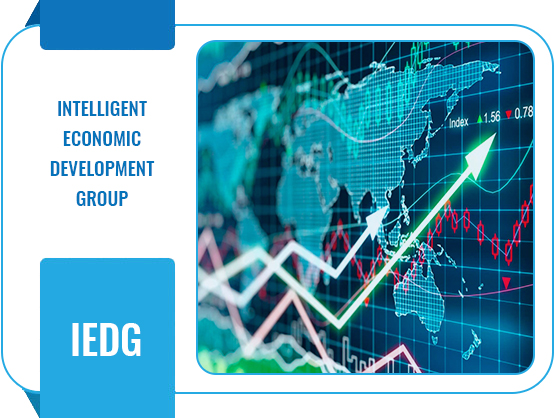
Intelligent Economic Development Group (IEDG)
The Intelligent Economic Development Research Group (IEDG) is a specialized research unit dedicated to exploring innovative approaches to economic development through the application of emerging technologies, data analytics, and advanced methodologies. IEDG focuses on leveraging intelligent solutions to drive sustainable economic growth, foster innovation, and address socio-economic challenges.
Here’s a detailed overview of IEDG’s research concentration and interests:
Data-Driven Economic Analysis
IEDG conducts data-driven economic analysis to understand the dynamics of economic growth, identify key drivers of prosperity, and inform evidence-based policy decisions. This includes analyzing macroeconomic indicators, industry trends, and regional economic data to assess the performance and competitiveness of economies. IEDG’s research aims to develop predictive models, economic forecasts, and scenario analyses to support strategic planning, investment decisions, and policy formulation in economic development.

Innovation Ecosystems and Entrepreneurship
IEDG explores the role of innovation ecosystems and entrepreneurship in driving economic development and fostering a culture of innovation. This includes researching the factors that influence the formation and growth of innovation clusters, startup ecosystems, and entrepreneurial networks. IEDG’s research examines the impact of policies, programs, and incentives on promoting innovation, technology transfer, and commercialization of research outcomes to spur economic diversification and job creation.
Technology Adoption and Digital Transformation
IEDG focuses on understanding the adoption and impact of emerging technologies, such as artificial intelligence, blockchain, and Internet of Things (IoT), on economic development processes and outcomes. This includes researching the opportunities and challenges of digital transformation for industries, governments, and societies, as well as the implications for productivity, competitiveness, and inclusive growth. IEDG’s research explores strategies for fostering technology adoption, building digital infrastructure, and promoting digital literacy to harness the potential of digital technologies for economic development.
Sustainable Development and Green Growth
IEDG investigates strategies for promoting sustainable development and green growth to address environmental challenges while fostering economic prosperity. This includes researching green technologies, renewable energy sources, and circular economy practices that contribute to environmental sustainability and resilience. IEDG’s research also explores policy frameworks, regulatory incentives, and public-private partnerships for transitioning to low-carbon, resource-efficient economies that promote sustainable development goals (SDGs) and mitigate climate change impacts.
Regional Development and Place-Based Policies
IEDG examines regional development dynamics and the effectiveness of place-based policies in promoting inclusive growth and reducing regional disparities. This includes researching spatial patterns of economic activity, agglomeration effects, and the role of infrastructure, connectivity, and human capital in shaping regional competitiveness. IEDG’s research explores innovative approaches to regional development, such as place-based investment strategies, cluster development initiatives, and regional innovation ecosystems, to stimulate economic growth and enhance regional resilience.
Trade and Globalization
IEDG analyzes the impact of trade policies, globalization, and international economic integration on economic development outcomes, including trade flows, investment patterns, and income distribution. This includes researching trade agreements, trade liberalization measures, and trade facilitation initiatives aimed at promoting trade diversification, enhancing market access, and fostering economic competitiveness. IEDG’s research also examines the implications of digital trade, e-commerce, and global value chains for economic development and explores strategies for leveraging international trade opportunities to drive sustainable growth and development.
Social Innovation and Inclusive Growth
IEDG investigates social innovation initiatives and inclusive growth strategies that address social challenges, reduce inequality, and promote economic opportunity for all segments of society. This includes researching social entrepreneurship, impact investing, and community development programs that empower marginalized groups, foster social cohesion, and create shared prosperity. IEDG’s research explores the intersection of economic development and social innovation, identifying strategies for building resilient, inclusive economies that leave no one behind.
Policy Evaluation and Impact Assessment
IEDG conducts policy evaluation and impact assessment studies to assess the effectiveness, efficiency, and equity of economic development policies and programs. This includes applying rigorous evaluation methodologies, such as cost-benefit analysis, randomized control trials, and quasi-experimental designs, to measure the impact of interventions on key economic indicators, such as employment, income, and productivity. IEDG’s research aims to generate evidence-based insights, policy recommendations, and best practices for improving the design and implementation of economic development policies and initiatives.
Financial Inclusion and Access to Finance
IEDG investigates strategies for promoting financial inclusion and expanding access to finance for underserved populations, including small and medium-sized enterprises (SMEs), women entrepreneurs, and rural communities. This includes researching innovative financial products, such as microfinance, mobile banking, and peer-to-peer lending, that enable individuals and businesses to access credit, savings, and insurance services. IEDG’s research also explores the role of fintech solutions, digital payment systems, and alternative financing mechanisms in overcoming barriers to financial inclusion and fostering inclusive economic growth.
Creative Industries and Cultural Entrepreneurship
IEDG explores the economic potential of creative industries, cultural entrepreneurship, and the arts as drivers of innovation, job creation, and economic diversification. This includes researching the economic impact of cultural and creative activities, such as design, fashion, media, and performing arts, on local economies and urban regeneration. IEDG’s research examines policies and programs that support creative industries, promote cultural heritage preservation, and leverage cultural assets for economic development, tourism promotion, and community revitalization.
R&D and Innovation Policy
IEDG investigates R&D and innovation policy frameworks that foster research collaboration, technology transfer, and knowledge diffusion to drive economic competitiveness and innovation-led growth. This includes researching the role of public research institutions, technology parks, and innovation clusters in supporting innovation ecosystems and facilitating industry-academia partnerships. IEDG’s research explores policy instruments, such as R&D tax incentives, patent regulations, and innovation grants, that incentivize private sector investment in research and innovation and promote the commercialization of innovative technologies and products.
Urbanization and Smart Cities Development
IEDG focuses on urbanization trends and smart cities development strategies that leverage technology and innovation to enhance urban quality of life, environmental sustainability, and economic competitiveness. This includes researching smart city initiatives, digital infrastructure investments, and data-driven urban planning approaches that optimize urban services, improve mobility, and promote inclusive urban development. IEDG’s research explores the role of IoT sensors, data analytics, and urban governance models in addressing urban challenges, such as congestion, pollution, and social inequality, while unlocking opportunities for economic growth and innovation in urban areas.
Global Value Chains and Economic Integration
IEDG investigates the dynamics of global value chains (GVCs) and the implications of economic integration for developing countries’ participation in global markets and value chains. This includes researching the role of trade agreements, regional economic integration initiatives, and industrial policies in shaping GVC participation, upgrading strategies, and enhancing value-added contributions. IEDG’s research examines the opportunities and challenges of GVC participation for economic development, industrial transformation, and job creation, as well as the policy interventions needed to maximize the benefits of economic integration for all stakeholders.
Economic Complexity Theory
Economic complexity theory, pioneered by economists Ricardo Hausmann, César Hidalgo, and others, posits that the level of economic development of a country is determined by the complexity and diversity of its productive capabilities. According to this theory, countries with diverse and complex export baskets, encompassing a wide range of products with varying levels of sophistication, tend to exhibit higher levels of economic development and resilience.
National Product Space
The concept of the national product space refers to the network of interconnected products and industries within an economy, representing the potential for diversification and upgrading. Each product is positioned within the product space based on its relatedness to other products, with closer proximity indicating greater similarity in production capabilities and technological requirements. The national product space provides insights into a country’s economic structure, specialization patterns, and potential for structural transformation.
Diversification and Resilience
Economic complexity theory suggests that countries with a diverse and balanced export portfolio are better positioned to withstand external shocks, adapt to changing market conditions, and achieve sustainable growth. By diversifying their export base across a wide range of products, countries can reduce their dependence on a few commodities or industries, mitigate the risks of commodity price volatility, and foster resilience against economic downturns.
Productive Capabilities and Technological Upgrading
The national product space framework highlights the importance of building productive capabilities and fostering technological upgrading to move into more sophisticated and higher-value-added industries. Countries with the capacity to produce complex products, requiring advanced technological skills and knowledge-intensive inputs, are more likely to achieve sustained economic growth and development. By investing in education, research and development (R&D), and innovation infrastructure, countries can enhance their productive capabilities and climb the technological ladder within the national product space.
Regional Economic Integration
The concept of the national product space is also relevant for regional economic integration initiatives, such as free trade agreements and economic unions. By mapping the product space of member countries, regional organizations can identify opportunities for intra-regional trade, specialization, and value chain integration. Regional integration efforts can facilitate technology transfer, knowledge spillovers, and economies of scale, thereby enhancing the competitiveness and resilience of member economies.
Data Analytics and Visualization Tools
Advances in data analytics and visualization tools have enabled researchers and policymakers to analyze and visualize the national product space in greater detail. Interactive mapping tools, such as the Atlas of Economic Complexity developed by the MIT Media Lab, allow users to explore the product space of countries, regions, and industries, identify structural bottlenecks, and assess diversification prospects. These tools facilitate evidence-based decision-making and policy analysis for economic development practitioners.
Through its interdisciplinary research agenda, IEDG aims to generate actionable insights, policy recommendations, and innovative solutions to promote sustainable, inclusive, and resilient economic development. By fostering collaboration, knowledge exchange, and capacity-building initiatives, IEDG contributes to building a more dynamic, equitable, and prosperous global economy that leverages the potential of intelligent technologies for the benefit of all.
